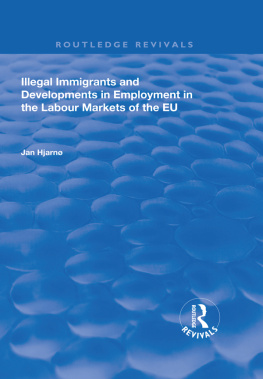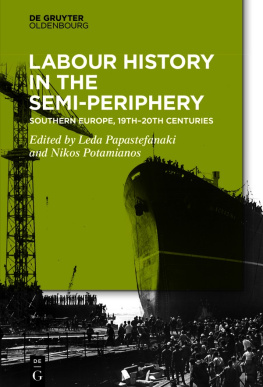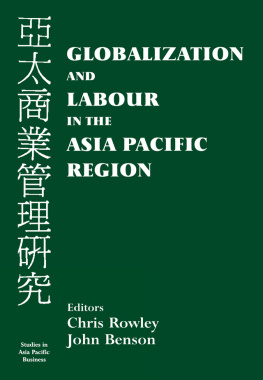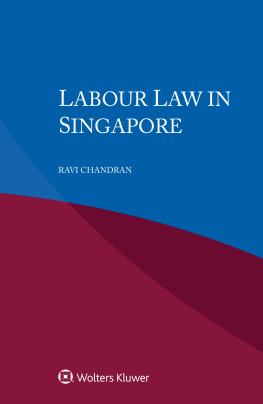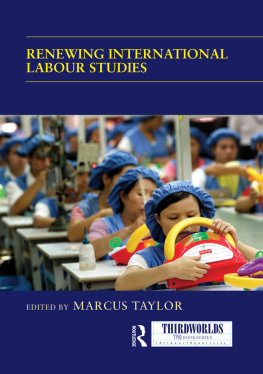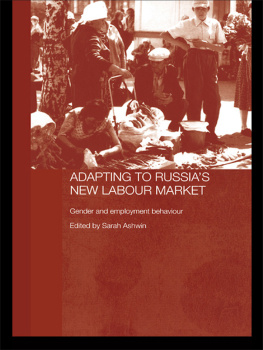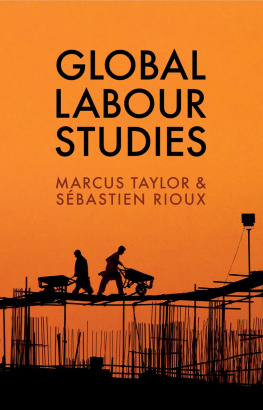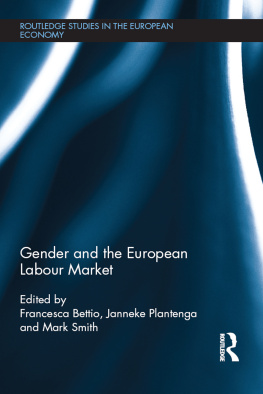Illegal Immigrants and Developments in Employment in the Labour Markets of the EU
First published 2003 by Ashgate Publishing
Reissued 2019 by Routledge
2 Park Square, Milton Park, Abingdon, Oxon, OX14 4RN
52 Vanderbilt Avenue, New York, NY 10017
Routledge is an imprint of the Taylor & Francis Group, an informa business
Jan Hjam 2003
All rights reserved. No part of this book may be reprinted or reproduced or utilised in any form or by any electronic, mechanical, or other means, now known or hereafter invented, including photocopying and recording, or in any information storage or retrieval system, without permission in writing from the publishers.
Notice:
Product or corporate names may be trademarks or registered trademarks, and are used only for identification and explanation without intent to infringe.
Publishers Note
The publisher has gone to great lengths to ensure the quality of this reprint but points out that some imperfections in the original copies may be apparent.
Disclaimer
The publisher has made every effort to trace copyright holders and welcomes correspondence from those they have been unable to contact.
A Library of Congress record exists under LC control number:
ISBN 13: 978-1-138-72568-3 (hbk)
ISBN 13: 978-1-315-19177-5 (ebk)
Shortly before Christmas 1995 Dr. Joan Ramakers, Hoger Instituut voor de Arbeid, Leuven asked me to participate in a seminar in Brussels, 1819 January 1996, on undocumented immigrants on the labour markets of the European Union. Before I received his call I had never paid any attention to undocumented immigrants in the labour market in Denmark because we dont have illegal labour immigrants in the labour market. He called my attention to the problem, and I no longer have any doubts that the very fact that we have none may be of relevance to understanding the factors governing the presence or non-presence of illegal immigrants. I am therefore very grateful to Dr. Joan Ramakers for making me aware of the phenomenon, which compelled me to look more closely into the matter and produce this book.
To my research assistant, Mr. Torben Jensen, I owe more than can be expressed in a few words. His knowledge, advice and suggestions were invaluable. He has checked all the figures and tables, and I am extremely obliged to him for all his labour. I also wish to thank my colleague at the Danish Centre for Migration and Ethnic Studies Dr. John Wrench, senior lecturer Steen Scheuer, Copenhagen School of Economics and senior lecturer Jens Lind, University of Aalborg. Their advice and co-operation have been indispensable. Further I wish to thank Mrs. Jackie Langelund and Mr. David Clayre, M.Sc. (Lond.), who corrected my English, translated parts of the manuscript and edited my far from tidy manuscript. Finally I also wish to thank our secretary, Mrs. Ulla Oehlenschlger, for preparing the manuscript for printing.
To all who made this study possible, I convey my warmest thanks.
Jan Hjarn
Director of Research - Danish Centre for Migration and Ethnic Studies
Esbjerg
Jan Hjarn, Director of the Danish Centre for Migration and Ethnic Studies, died suddenly in Autumn 2002 and did not live to see the printed book. He was a pioneer in Denmark in the academic study of migration and ethnic relations, and the book stands as a testament to his extensive and unique contribution to this field of study.
1
Introduction
In 1993, Professor D. S. North wrote in an OECD report that governments in democratic countries would never be able to solve the problem of illegal immigration precisely because they are democratic countries. In a sense, the struggle over immigration policy is like a struggle over environmental policy; the narrowly focused opponents of immigration enforcement, along with their diverse allies, like the narrowly focused opponents of pollution, have much more at stake than those on the other side of the issue. Reducing acid rain is probably a good idea for society as a whole, but no individuals or institutions will benefit quickly in any tangible way. However, reducing acid rain will, quickly and tangibly hurt a number of specific interests. Similarly, effective immigration enforcement will bring major losses to certain narrow interest groups but no immediate tangible benefits to any broader groups. For this simple reason, therefore, democratic governments, according to North, will lack the willpower to apply the economic, diplomatic and intellectual resources necessary to implement a totally effective restriction of illegal labour immigration.
This is not correct. There are at least four democratic countries in which governments have experienced no difficulty in solving the problem of illegal labour immigrants: Denmark, Norway, Finland and Sweden. Apart from Finland, these four countries have not practised a more restrictive immigration policy than most other countries in the EU, but there are still practically very few illegal labour immigrants.
The purpose of this book is to answer the question:
Why are there hardly any illegal immigrants in the labour markets in the Nordic countries?
As a starting point I will begin with a short story from real life:
I recently met a friend who grows tomatoes. When I asked how he was doing, he said it was difficult to make a living because his competitors in Holland used low-paid illegal immigrants to pick the crop. He said: Dont imagine the Dutch tomato you had at lunch was picked and caressed by a blue-eyed, blonde, big-breasted Dutch girl in clogs. It was more likely picked and packed by a thin, underpaid, dark-haired, frightened Tamil who had his application for political asylum turned down long ago, and who has survived since by working illegally in Holland. You will find him and a couple of other Tamils living very primitively near the greenhouse boiler. If the Dutch authorities learn of their presence, they would ask the employer to send them away and, if he agrees, he would not normally be punished. The Dutch authorities are more interested in protecting employers ability to compete, and in Dutch tomato exports, than they are in punishing producers who exploit poor illegal Tamil labourers. My response was: Why dont you get yourself a couple of Tamils who have been refused political asylum and who would be happy to work for a fraction of what you pay a Danish labourer? He replied: If I followed your advice I would be approached in no time by the foreman of the local trade union, who would tell me to lay them off immediately or he would blockade my production, report me to the Employers Association and file a case against me in the Labour Court. He could put me out of business without any trouble, and I could not expect any understanding or support from the Employers Association. My peers would consider me a pariah and ostracise me mercilessly. I wouldnt dare employ an illegal immigrant. Comparing the risk with the possible profit, it is just not worth it.

